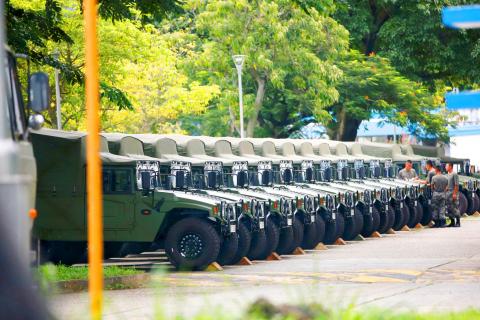China yesterday sent fresh troops to Hong Kong as part of a “routine” garrison rotation, as the territory braced for a new round of violent protests after police refused permission for a mass rally this weekend.
Hong Kong has been mired in more than three months of political crisis, with police and protesters engaging in increasingly violent clashes, prompting Beijing to ramp up its rhetoric and a public relations campaign against the anti-government movement.
Chinese state media broadcast a video of armored personnel carriers and trucks driving across the Hong Kong border, describing it as a routine rotation of the garrison stationed in the semi-autonomous territory.

Photo: Reuters
“The Hong Kong garrison of the Chinese People’s Liberation Army [PLA] on Thursday morning completed the 22nd rotation since it began garrisoning Hong Kong in 1997,” Xinhua news agency reported.
“Before coming ... we learned about the situation of Hong Kong,” PLA Lieutenant Colonel Yang Zheng (楊政) said in a slick public relations video. “We’ve strengthened our training ... to make sure we can fulfill our defense duties.”
The rotation came less than 24 hours after police denied permission for a new mass rally planned for tomorrow that was expected to draw hundreds of thousands of people to the streets — the 13th consecutive week of protests.
Police have previously denied permission for rallies to take place, but the orders have largely been ignored.
In a letter to the rally organizers, the Civil Human Rights Front, police said that they feared some participants would commit “violent and destructive acts.”
Protesters have carried out “arson and large-scale road blockades” and “used petrol bombs, steel balls, bricks, long spears, metal poles, as well as various self-made weapons to destroy public property,” the letter said of previous rallies.
On Sunday, police deployed water cannon trucks for the first time and one officer fired a live round as a warning shot from his sidearm to fend off protesters after a sanctioned rally erupted into some of the worst violence of the past three months.
Tomorrow’s rally was called to mark five years since Beijing rejected political reforms in Hong Kong, a decision which sparked 79 days of political protests that became known as the “Umbrella movement.”
Civil Human Rights Front leader Jimmy Sham (岑子杰) — who said that he escaped unhurt after being attacked by masked men with a baseball bat and knife earlier yesterday — said that the group would appeal the police decision.
“You can see the police’s course of action is intensifying, and you can see [Hong Kong Chief Executive] Carrie Lam [林鄭月娥] has in fact no intention to let Hong Kong return to peace,” Sham said.
Anti-government demonstrators have been urged to gather in the city center and march to the Hong Kong Liaison Office, which represents China’s central government in the territory, but both aspects, which need permission from authorities, have been banned.

FREEDOM OF NAVIGATION: The UK would continue to reinforce ties with Taiwan ‘in a wide range of areas’ as a part of a ‘strong unofficial relationship,’ a paper said The UK plans to conduct more freedom of navigation operations in the Taiwan Strait and the South China Sea, British Secretary of State for Foreign, Commonwealth and Development Affairs David Lammy told the British House of Commons on Tuesday. British Member of Parliament Desmond Swayne said that the Royal Navy’s HMS Spey had passed through the Taiwan Strait “in pursuit of vital international freedom of navigation in the South China Sea.” Swayne asked Lammy whether he agreed that it was “proper and lawful” to do so, and if the UK would continue to carry out similar operations. Lammy replied “yes” to both questions. The

‘OF COURSE A COUNTRY’: The president outlined that Taiwan has all the necessary features of a nation, including citizens, land, government and sovereignty President William Lai (賴清德) discussed the meaning of “nation” during a speech in New Taipei City last night, emphasizing that Taiwan is a country as he condemned China’s misinterpretation of UN Resolution 2758. The speech was the first in a series of 10 that Lai is scheduled to give across Taiwan. It is the responsibility of Taiwanese citizens to stand united to defend their national sovereignty, democracy, liberty, way of life and the future of the next generation, Lai said. This is the most important legacy the people of this era could pass on to future generations, he said. Lai went on to discuss

AMENDMENT: Climate change is expected to increase the frequency of high-temperature days, affecting economic productivity and public health, experts said The Central Weather Administration (CWA) is considering amending the Meteorological Act (氣象法) to classify “high temperatures” as “hazardous weather,” providing a legal basis for work or school closures due to extreme heat. CWA Administrator Lu Kuo-chen (呂國臣) yesterday said the agency plans to submit the proposed amendments to the Executive Yuan for review in the fourth quarter this year. The CWA has been monitoring high-temperature trends for an extended period, and the agency contributes scientific data to the recently established High Temperature Response Alliance led by the Ministry of Environment, Lu said. The data include temperature, humidity, radiation intensity and ambient wind,

SECOND SPEECH: All political parties should work together to defend democracy, protect Taiwan and resist the CCP, despite their differences, the president said President William Lai (賴清德) yesterday discussed how pro-Taiwan and pro-Republic of China (ROC) groups can agree to maintain solidarity on the issue of protecting Taiwan and resisting the Chinese Communist Party (CCP). The talk, delivered last night at Taoyuan’s Hakka Youth Association, was the second in a series of 10 that Lai is scheduled to give across Taiwan. Citing Taiwanese democracy pioneer Chiang Wei-shui’s (蔣渭水) slogan that solidarity brings strength, Lai said it was a call for political parties to find consensus amid disagreements on behalf of bettering the nation. All political parties should work together to defend democracy, protect Taiwan and resist